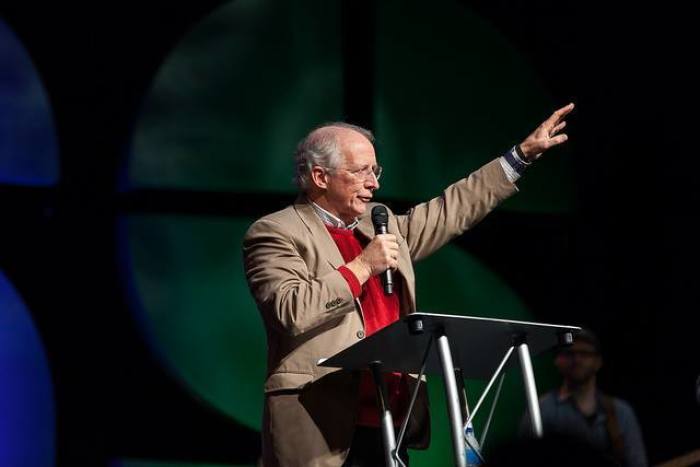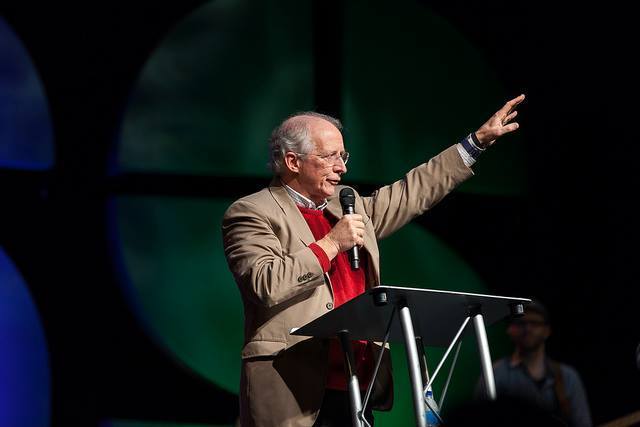
Prominent theologian and Bible teacher John Piper denounced “gender pronoun hospitality” this week, considering the practice unbiblical and spiritually harmful to trans-identified people.
In an episode of his podcast “Ask Pastor John,” uploaded Monday, Piper, an author and chancellor of Bethlehem College and Seminary in Minneapolis, Minnesota, was asked his thoughts by an unnamed elder of a church about their ministry at a nearby college that recently considered engaging in “gender pronoun hospitality.”
The concept of “gender pronoun hospitality” involves a person using the preferred pronouns and name of a trans-identified individual, even if the person doesn’t agree with LGBT ideology.
“The argument is that there are times when, for the sake of evangelism, one may decide to call a person by their chosen gender if such an act removes a possible barrier in sharing the Gospel,” stated the elder.
“The ask for our church is for a person to have the freedom, in the moment, to do this, limited to evangelism contexts, limited to conversations with those who are not believers. If someone claims to be a follower of Christ, such ‘pronoun hospitality’ would not apply.”
Piper, who served as pastor at Bethlehem Baptist Church for over 30 years, opposed the idea of “connecting the beautiful biblical word ‘hospitality’ with the unbiblical concept of ‘gender pronoun,'” calling it “unhelpful and misleading.”
“We ought to be hospitable, but we ought not to be affirming of pronouns that designate a destructive choice and a false view of reality. It is possible to be hospitable and honest,” Piper said.
The theologian noted that most often when people speak with someone directly, the most frequent “pronoun that you use is you.”
“So, it may be possible to engage a person directly without touching the issue of pronouns,” he said. “Now, of course, that doesn’t work when dealing with proper names. Is Andy now Angie? You may not even know that Angie was once Andy. So, stepping into the conversation, you may not have any choice unless you simply avoid the name, which is possible.”
Piper said he prefers the term “sex” over “gender,” believing that the latter is “a compromise with sinful views of reality” and the byproduct of “radical feminists” in the 1970s.
“I think using the word ‘gender’ where the right word is ‘sex’ is like using the word ‘marriage’ for a relationship between two men or two women. It’s not marriage. It is so-called ‘marriage,'” he continued.
Piper referenced the Nashville Statement, a theologically conservative declaration released in 2017 by the Council on Biblical Manhood and Womanhood that Piper had signed.
“The Nashville Statement is right to say, ‘Self-conception as male or female should be defined by God’s holy purposes in creation and redemption as revealed in Scripture.’ But calling a man a woman or a woman a man defies that holy purpose of God. It defies God,” he said.
Piper said affirming trans-identity “involves living a lie” that “regularly leads to destructive and irreversible surgeries and treatments.”
“Therefore, the greatest possible care should be taken before one gives any impression of approving or even being mildly disagreeable toward so-called transgenderism,” he concluded.
As Evangelicals debate how to witness to members of the LGBT community, there has been some conversation over whether Christians should use the preferred pronouns of a trans-identified person.
In 2019, then-Southern Baptist Convention President J.D. Greear said on a podcast titled “Ask Me Anything” that he would use a trans-identified person’s preferred name and pronouns to showcase “hospitality” but would also affirm biblical truth.
“If a transgender person came into our church, came into my life, I think my disposition would be to refer to them by their preferred pronoun when we want to talk about gender,” stated Greear. “I will be clear with him on the truth. The question is: Is that the battlefront that you want to choose?”
“That is the way that I would lean in this,” he added. “I would say this is one of perhaps Roman 14 situations where you need to do what your conscience is allowing you to do.”








